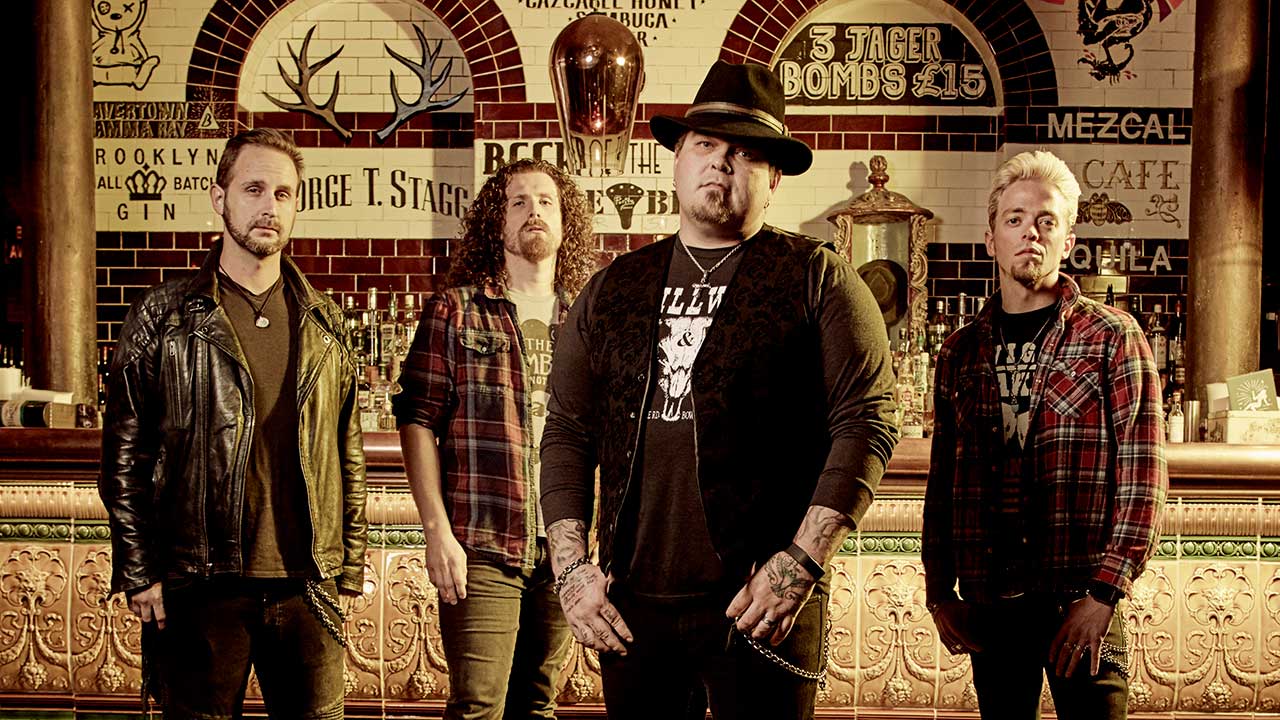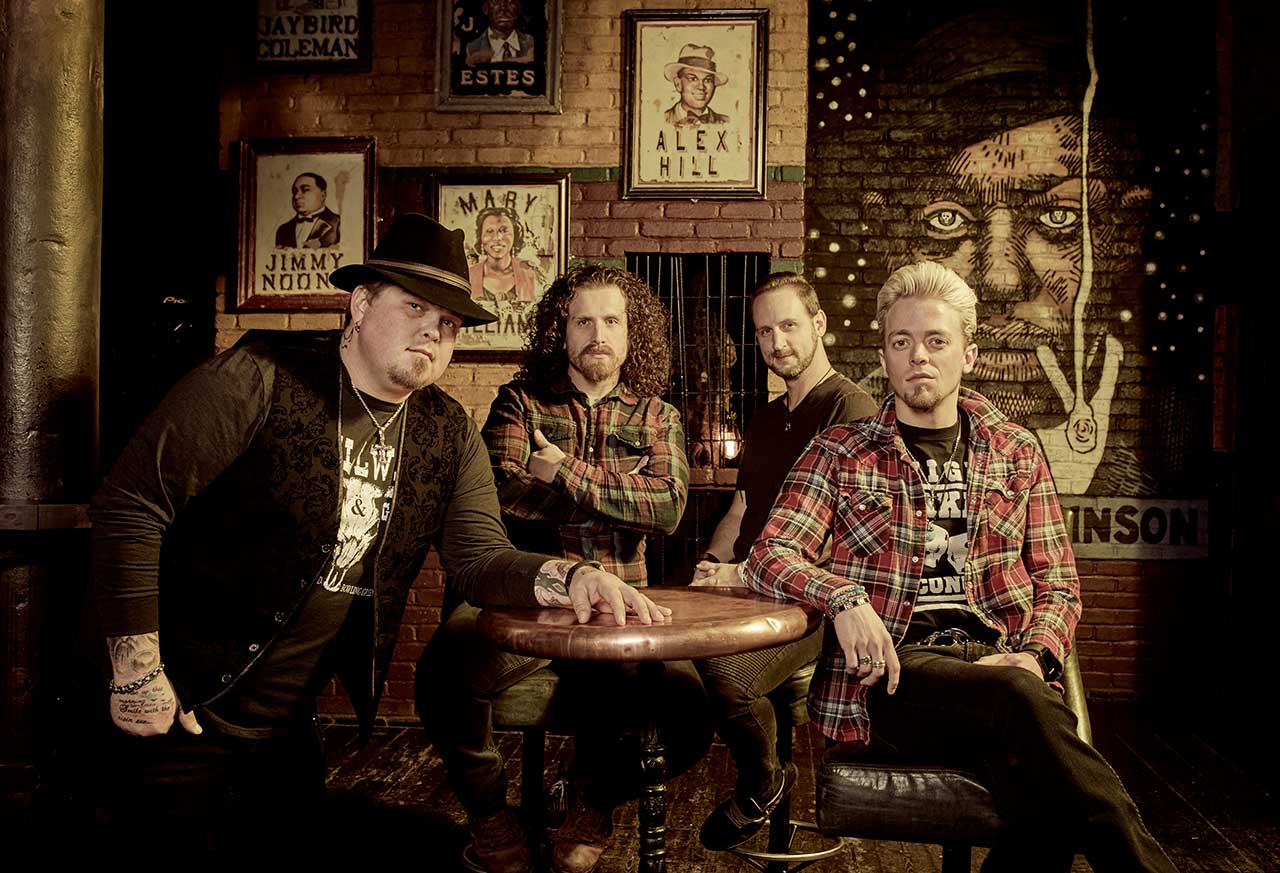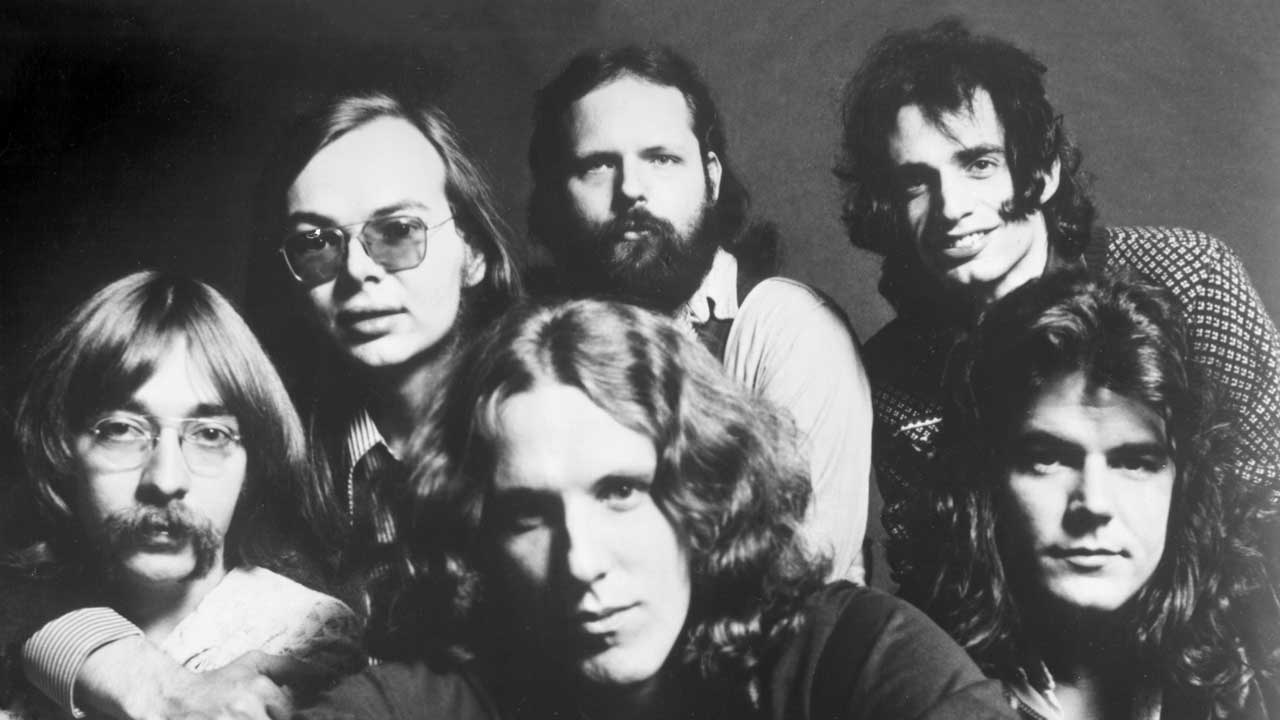Black Stone Cherry: the secret ingredients that spice up their southern-fried sounds
The Beatles to Bizkit, Parton to Presley, Sabbath to gospel: it's all added to the musical gumbo that makes up Black Stone Cherry

Select the newsletters you’d like to receive. Then, add your email to sign up.
You are now subscribed
Your newsletter sign-up was successful
Want to add more newsletters?

Every Friday
Louder
Louder’s weekly newsletter is jam-packed with the team’s personal highlights from the last seven days, including features, breaking news, reviews and tons of juicy exclusives from the world of alternative music.

Every Friday
Classic Rock
The Classic Rock newsletter is an essential read for the discerning rock fan. Every week we bring you the news, reviews and the very best features and interviews from our extensive archive. Written by rock fans for rock fans.

Every Friday
Metal Hammer
For the last four decades Metal Hammer has been the world’s greatest metal magazine. Created by metalheads for metalheads, ‘Hammer takes you behind the scenes, closer to the action, and nearer to the bands that you love the most.

Every Friday
Prog
The Prog newsletter brings you the very best of Prog Magazine and our website, every Friday. We'll deliver you the very latest news from the Prog universe, informative features and archive material from Prog’s impressive vault.
You know Black Stone Cherry by now: four earnest guys from small-town Kentucky, typically found delighting arenas full of fans with their muscular, radio-friendly hard rock, plus southern chops from the Book Of Skynyrd. One could easily leave it at that. Except the full story goes a little deeper.
Last year, they released an EP of first-class blues covers. Nine years ago they were playing fiery renditions of Folsom Prison Blues and Hoochie Coochie Man at Rockpalast. Prior to that they all grew up with blues, rock, bluegrass, country, metal and soul, much of it discovered through old posters taped up (literally to keep the warmth in) on the cracked walls of their “practice house” in the woods outside Edmonton.
It was here that the founding three (drummer John Fred Young and his kindergarten pal Chris Robertson, plus bassist Jon Lawhon) held a party as teenagers, which a guitarist friend-of-a-friend called Ben Wells came to. It turned into a big bluesy jam, and the next day the four of them started Black Stone Cherry. Their practice house was originally used by Young’s dad’s band, the Kentucky Headhunters, and in its walls are years of rootsy music history.
“Oh yeah, that’s the backbone of this band,” singer/guitarist Robertson explains, replacing his trilby in its smart case after our photo shoot at the Blues Kitchen in Shoreditch, London. Swish headgear aside, the frontman cuts a stocky, serious, down-to-earth figure. Bob Marley lyrics are tattooed on his hands – remnants of darker days fighting depression, and finding light through the reggae icon.

Suddenly a six-foot-something tower of curly hair with a spectacularly Dixie-baked accent strides over to say hi. One part assured bro, several parts friendly chatterbox, John Fred Young has been having a look the venue’s impressive bourbon shelves, but this Thursday morning he drinks mostly coffee. “Mayyn, have you seen what they got here?” he drawls. “This place is awesome!”
Eventually sitting at a table, Young, Robertson and Lawhon (Wells joins us later) are, unsurprisingly, brimming with enthusiasm for Black Stone Cherry’s new, sixth album, Family Tree.
“On [2016’s] Kentucky there was still a conscious effort to keep it relatively heavy,” Robertson says. “With the new record we said, ‘To hell with that – let’s just write great rock’n’roll songs.’ We put down all the barriers we’d put up for ourselves.” “It’s probably the truest representation of our band, sonically, from all of our influences over the years,” Young agrees, “and just being who we are, without the concern of formulating anything to get on American rock radio.”
Sign up below to get the latest from Classic Rock, plus exclusive special offers, direct to your inbox!
Songs weren’t over-rehearsed, and tracks were recorded with minimal takes, which helped keep the results loose and rootsy. Without sacrificing the hard-rock brawn that their previous five albums were built on, Family Tree is audibly closer to their bluesy, old-school roots.
“Working on this new material was like shedding skin,” says Lawhon, a Florida-born father of two who moved to Kentucky in his teens. “It’s the first time that everybody, for every second we were in the studio, had a smile on their face. It just felt right. There was nothing forced about it.”
“This is the music we were supposed to have been playing our whole career,” Robertson says seriously. “That’s not a knock to the albums we’ve put out, because we’re extremely proud of that stuff. But this record has a feeling of ‘this is what it was supposed to be all along’.”
So, let’s take a look inside the Black Stone Cherry vault…

"Supercharged" Electric Blues
Initially, it was the rocky, ferocious bluesiness of Jimi Hendrix that appealed to Robertson while he was growing up.
“It was Red House and Hear My Train A Comin’,” he remembers. “And then I got into some Stevie Ray Vaughan, and then I started going back to the Muddy Waters stuff. I have a heartfelt appreciation for Delta blues, but my favourite blues is the electric Chicago stuff – y’know, where it’s supercharged. But at the same time the Chess [label] Howlin’ Wolf collection is some of the greatest music ever created, and it was one microphone in a room with a bunch of guys. But yeah, my introduction to blues lay a lot on Hendrix. And he was a rock’n’roll guy, but you can’t deny Red House.”
Their three heads bob in agreement, just as Freddie King’s Going Down starts playing over the speakers.
“John Fred’s dad got me into Freddie King,” Robertson says. “I was about fifteen or sixteen. Our voices aren’t the same, but they have similarities: they’re big loud voices. And even the guitar playing, the snappiness that Freddie had, playing those Gibson 345s and with just everything on ten. It’d tear your fucking head off, man. Freddie King and Howlin’ Wolf are probably my two favourite blues artists ever.
Older Blues and "Motown Rock'n'Roll"
For bassist Lawhon, it’s the earlier blues legends that drew him in. “I’m more of a Robert Johnson fan,” he says. “There’s a dark, eerie side that I really dig: Me And The Devil Blues, Hellhound On My Trail, that’s some scary shit.”
Robertson: “When you get into that stuff, towards Robert Johnson, I like Son House.”
“Death Letter Blues is probably one of the scariest songs that was ever written,” Young says enthusiastically. “
Son House just had this…” Robertson searches for the words. “He would play guitar in one time signature and sing in another. Jesus, it’s just incredible stuff.”
Was there much of that sort of music being played, or jammed, in Edmonton?
“No,” Robertson says. “And my dad was a classic rock and country guy, a big Waylon Jennings fan. It was John Fred’s dad who instilled the blues into us.”
So how did Young Senior first discover the blues, in a country-heavy Bible Belt town?
“My dad and uncle Fred [Young, also in the Kentucky Headhunters], when they were ten and eleven, knew some older guys that lived on the farm for my grandparents,” Young explains. “They used to have my dad and my uncle go and buy ’em liquor cos they were too old to get out. They were probably eighty, eighty-five years old, and they had all kinds of blues records. And when I was four or five I was watching my dad and uncle play music, hearing them talk about blues artists – Muddy Waters, Howlin’ Wolf, Lightnin’ Hopkins, all the greats.”
Young’s first love, however, was the Motown his parents played at home. Ain’t Nobody and James Brown on the new record reflect this, and also R&B, Aretha Franklin…
“Sam Cooke, Percy Sledge, Marvin Gaye, Al Green…” Young continues. “We have three wonderful ladies back home, and they are some of the best soul singers you’ll ever find. They kill it. James Brown, Ain’t Nobody, those songs are pretty much ‘rock’n’roll Motown’ – from our neck of the woods.”
Obscure (and less obscure) classic rock, from that house in the woods
BSC guitarist Ben Wells joins us at this point, smiling shyly. Of the four, the difference between Wells’s offstage and onstage persona is the biggest: small with a gelled blond quiff, his animated stage self and rock star high kicks seem to belong to someone else.
Not that this prevented him being welcomed into the BSC family, who, growing up in a ‘dry’ county, had “nothing to do but play rock’n’roll”. Instead of going to high-school parties, they’d head over to the practice house after school, jam for hours, look at the posters of old blues and rock stars and drink liquor swiped from their parents.
“That house is a museum out in the woods,” Young says earnestly. “It carved us out, what we are now. Everybody loves Led Zeppelin, the Stones, The Beatles – I love the Beatles, mayyn. But there was some stuff that we were so fortunate to get introduced to. Everybody thinks Lynyrd Skynyrd is the main influence for us, and they are a big influence, but there were bands like Cactus that were a huge influence…
“Trapeze,” Robertson adds.
“Yes! Trapeze, Mountain…” Young enthuses.
“The big ones for us are Skynyrd, Zeppelin, Aerosmith and Free, as far as your classic rock bands are concerned. And for me I hear the Allman Brothers influence coming through on this new record.”
Heavy metal and bootscootin’ country halls
As food menus are passed around, talk flits between burgers and the beefier end of BSC’s spectrum of musical influences. They cite Black Sabbath as their biggest classic heavy influence, but from there it’s predominantly more recent artists that they’ve looked to, from Pantera and Metallica to little-known Kentucky acts.
“There were great local bands,” Robertson says. “There’s a band called Superfuzz that were just fucking incredible. There was a big metal scene when we were growing up. It was really eclectic. We had everything from stoner rock to country bands to metal bands.”
Recollections from their own early gigs, however, are a little less glowing.
“The dead space between songs…” Robertson deadpans.
“That famous song ‘Tuning’,” Lawhon says laughing. “We’d play that a lot.”
“I’ll tell you how sparse the scene was,” Young says. “There was a place in Cave City Kentucky called Factory, and it was a boot-scootin’ line-dance country hall. We literally had to beg them to do a rock night on Friday so we could go in and have our ten buddies come in and pay the door fee so we could play music. It was basically rehearsal.”
It worked, however, and they began to draw bigger audiences.
“We’d play anywhere: the skating rink, the Catholic church meeting place,” Wells remembers. “When you were in high school, if you could convince seventy-five kids on a Friday night to not go to a basketball or football or baseball game, you were doing something.”
Elvis Presley and Dolly Parton
Reminiscing on a trip to watch former Stray Cats frontman Brian Setzer in Iowa (“One of our buddies, Kevin McKendree, plays keyboards with him,” says Young) leads us to Wells’s other rock’n’roll love, Elvis Presley.
“Yes, ma’am,” he nods, smiling. “He’s been part of my life as long as I can make a memory. I love his music, his movies, the whole package.”
You wouldn’t have been see him live, obviously, but The King has many impersonators. Have you guys seen any?
“I grew up doing that, actually,” Wells says. “I had a jumpsuit made and I wore a black wig and I had the scarves…
“I was probably seven or eight years old,” he adds, “so I wouldn’t necessarily call myself a singer! I still incorporate the karate moves on stage.”
“He would go round all the nursing homes, schools,” Young says, grinning. “He’d make women faint. He was a li’l heartbreaker…”
“The ’68 Comeback Special is probably my favourite Elvis era,” Young says. “People would not have discovered blues music if it wasn’t for Elvis Presley. He was highly influenced by blues, gospel and country.” He grins and shakes his head. “Honestly, this band is so eclectic. We saw Dolly Parton in Oklahoma…” “
And we went as fans, not because it’s funny to go see Dolly Parton,” Wells says earnestly. “I’ve always called her the female Elvis. She’s the total package, she knows how to entertain the crowd, everybody loves her.”
“She was shaking that sequin dress she had afterwards,” Young remembers, “and we were picking up little sequins off stage. I got enough to make a purse or something…”
Finding peace with gospel and Pink Floyd
Living right in Bible Belt country, Black Stone Cherry grew up in the heartland of southern gospel. For Wells, raised in a Baptist household, and who now attends a non-denominational church, this music has held real meaning.
“I love the old hymns,” he says. “I know sometimes people might think they’re slow and sappy, but when you hear those, especially southern gospel, when there are groups singing with those voices harmonising, I love that. I think it’s so peaceful, y’know? That’s what drew me to the Elvis gospel stuff.”
“I haven’t been [to church] in a while but Ben goes regularly,” Robertson says. “You were talking about the peaceful feeling you get from the hymns. That’s what Pink Floyd does for me. Just sit back and listen to Dark Side Of The Moon or something, man.”
Young adds: “See, I never was a Pink Floyd fan, until about six years ago when Chris was like: ‘Dude, you need to listen to Pink Floyd…’ We evolve with time, but I think the stuff that we all grew up with we still love.”
“I’ve got two girls myself now,” Lawhon joins in, “and your kids will pick up things that you listen to. We’ve got one of those Amazon Alexa things, and they steal it all the time. I’ll be walking through the house and I’ll hear The Beatles or Ray Charles rocking out from my kids’ playroom. I think it’s awesome that it’s that and not whatever pop crap is going on right now!”
“I like that modern pop crap,” Young pipes up. Lawhon: “I like a lot of modern pop stuff, but not the kids’ pop.”
Young: “I could sing you every Disney song that’s out there…”
Snakes, Gators and, er, Limp Bizkit
Ever loyal to their roots, and even with family duties to juggle (Young, Robertson and Lawhon are all fathers, Wells has beagles), Black Stone Cherry still jam at the old practice house – but only in cold weather.
“If you go when it’s hot, the fiddler spiders are moving,” Young explains. “The ones we have had, like, Teenage Mutant Ninja Turtle slime kicked all over ’em and they’re about as big as an orange.”
“We have poisonous snakes too, and I’m scared shitless of all of ’em,” Robertson adds, shuddering.
“At least the gators are further south, because they don’t do well with cold,” Lawhon explains, “and it’s pretty damn cold in Kentucky in winter.”
“Just the ones that somebody had as a pet indoors,” Young drawls, incredulously, “and it gets a little big so they put it outside…”
Robertson: [adopts ‘dumbass’ voice] “So I bought this alligator for a pet, I didn’t realise it was a fucking dinosaur…”
“To get all Discovery Channel on you,” Young jumps in, “there was a lot of people turning pythons and boa constrictors loose in Florida – they’re not native there, obviously, they’re from South America. And they’re breeding and they’re these big, jacked-up, went-to-the-gym snakes.”
“Leave it to the Floridians,” Florida native Lawhon sighs. “The local music scene there was crap. It was a bunch of wannabe rap rock. You’re talking late nineties. It was not good.”
“I don’t care who you are, you can’t not like Limp Bizkit, okay?” Young says adamantly. “When that band came out, I got Family Values. It was filthy. We couldn’t sit here and say that Korn and Limp Bizkit didn’t have an influence on us when we were growing up, cos they were massive…”

As plates of American BBQ classics and New Orleans soul food arrive, chatter becomes musings on Limp Bizkit album Chocolate Starfish And The Hot Dog Flavored Water, and the gems of their tour bus playlist, which veer from Muddy Waters and the Traveling Wilburys to Justin Timberlake and Travis Tritt. And it’s all part of the BSC world, created by four friends who started a band, became huge and remain undivided after 17 years.
“There was never an ‘if’ we get to do this,” Lawhon says. “‘If’ was never the term. It was always ‘when’. There were no second options.”
Family Tree is out now via Mascot. Black Stone Cherry tour the UK in December (dates below).

Black Stone Cherry UK Tour
Dec 6: Motorpoint Arena, Cardiff
Dec 7: Metro Radio Arena, Newcastle
Dec 9: SECC, Glasgow
Dec 10: Manchester Arena, Manchester
Dec 11: Birmingham Arena, Birmingham
Dec 12: First Direct Arena, Leeds
Dec 14: SSE Arena, Wembley, London

Polly is deputy editor at Classic Rock magazine, where she writes and commissions regular pieces and longer reads (including new band coverage), and has interviewed rock's biggest and newest names. She also contributes to Louder, Prog and Metal Hammer and talks about songs on the 20 Minute Club podcast. Elsewhere she's had work published in The Musician, delicious. magazine and others, and written biographies for various album campaigns. In a previous life as a women's magazine junior she interviewed Tracey Emin and Lily James – and wangled Rival Sons into the arts pages. In her spare time she writes fiction and cooks.
